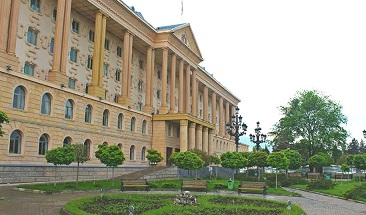Natia Gogolashvili
Convicted woman, whose name is anonymous upon her request, was arrested on January 23, 2009 at the checkpoint to Abkhazia in the village of Orsantia, Zugdidi municipality. However, later her detention was recorded by January 24. She is victim of inhuman and degrading treatment. Based on the November 24, 2014 court decision, the convicted woman received victim status. According to the information of Human Rights Center, nowadays, she is the only convicted woman, who received the status of victim of torture and inhuman treatment based on the court judgment into another case.
HRC lawyer Eka Kobesashvili appealed the Administrative Law Panel of the Tbilisi City Court on behalf of the convicted woman. The applicant claimed compensation for physical and moral damage from the MIA – 30 000 GEL for physical damage and 50 000 GEL for moral damage. The City Court determined a shortcoming in the appeal and noted that in accordance to the law, an applicant shall be freed from the court fee only when claiming the compensation for physical damage.
Eka Kobesashvili clarified that, in accordance to the Article 5 Part I – “h” of the Law of Georgia on State Tax, the following persons are freed from the payment of court fees in common courts: applicant who claims reimbursement of the material damage caused by offence. In accordance to the subparagraph “e” of the same Article, the following applicants are freed from the payment of the fee in common courts: applicants who claim reimbursement of damage caused by health injury. Consequently, the Article 5 Part I – “e” does not differentiate reimbursement of physical and material damage. Considering that, in accordance to this particular provision in the law, the claimant shall be freed from the payment of court fee.
“Human Rights Center has processed several similar cases, where beneficiaries claimed compensation for material and moral damage both in the City and Appeal Courts. The claimants in all those cases were freed from paying the fee in the court. All of them were male convicts but the court demonstrated different approach towards female prisoner. It is necessary that the court established common practice with regard to all convicts and did not discriminate applicants based on gender or other grounds,” Eka Kobesashvili said.
The lawyer added that as the claimant could not pay the court fee for 50 000 GEL, the appeal was corrected and she requested only 10 000 GEL for the moral damage and paid 300 GEL as a court fee.
The convicted woman is victim of inhuman treatment
The convicted woman states that during detention [law enforcement officers] planted drugs on her and demanded to admit the crime. In the moment of detention, she was pregnant. In her letter to HRC the convicted woman described the developments of the detention day in details. She said one of the senior law enforcement officers took a ball wrapped in silver paper from his pocket and handed to another officer standing next to him and ordered to prepare protocol about my arrest. Later, the court relied its judgment on this “evidence” – the verdict stated that the narcotic substance heroine was withdrawn from her left pocket.
In accordance to the prisoner’s letter, after the detention, she was taken to the police unit in Darcheli village, where she was demanded to write a protocol. The protocol read that the narcotic substance belonged to her. The convicted woman did not sign the document and according to her statement, she was taken to the Zugdidi police department on the same day. Senior police officer Megis Kardava entered the small room where she was; Kardava is now convicted for the torture and inhuman treatment of prisoners.
„Megis Kardava was beating me though I had told him that I was pregnant. He was kicking me in the belly and periodically was hitting my head against the wall. The wall broke as it was made of gypsum board. I felt bad and asked for water. He [Megis Kardava] called officer and whispered something. About ten minutes later he brought a liquid in a single-use cup and asked to drink. I understood that it was not water and refused. Megis Kardava made me open mouth under the threat of gun, broke my tooth and made me drink the liquid. 10-15 minutes later I fainted. I do not know how long I was unconscious but when I recovered, I was lying on the floor and heard voices that people were telling each other – she is dead. Megis Kardava told them – if she is dead then throw her away from the Orsantia Bridge and people will think the Abkhazians killed her… I opened my eyes and felt that I was wet. I was bleeding as I was pregnant and was bleeding from the nose too; also I was vomiting,” the convicted woman wrote in her letter to HRC.
As the prisoner said she was taken to drug-test which confirmed that she was under the influence of drugs. The convicted woman was taken back to the police unit and paced in the same room where Megis Kardava beat her. The woman said her torture lasted for another hour after she was brought back from the drug-test.
According to the letter, regardless inhuman treatment she did not confess the crime and did not sign the protocol.
The court will discuss the application of the victim of inhuman treatment about moral and material damage next month. The first hearing is scheduled on April 19.
The article was prepared in the frame of the project – “Monitoring Conditions of Juvenile and Female Prisoners in Georgian Penitentiary”, which is implemented by Human Rights Center with the Bulgarian Development Aid. The views in the article does not necessarily express the views of the donor and it is responsible for the content of the article.
News
December 13, 2023
Ethnic minorities outside the peace dialogue
November 6, 2023
‘Peace’ agenda of political parties
Popular
Articles
February 13, 2024




